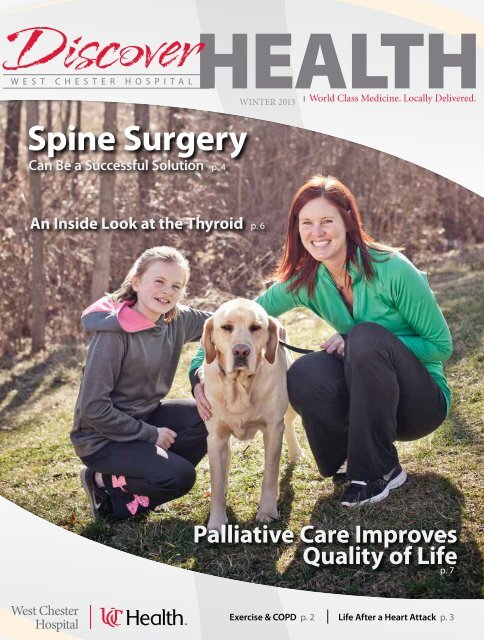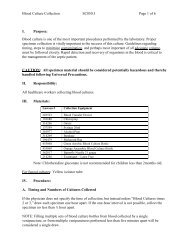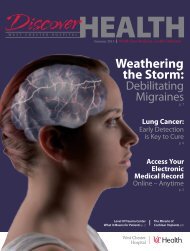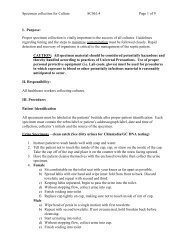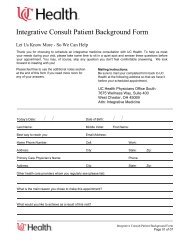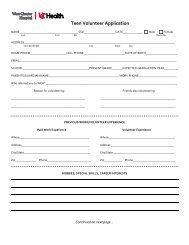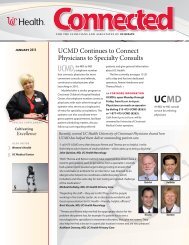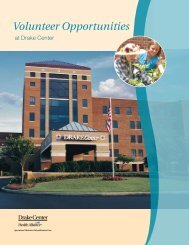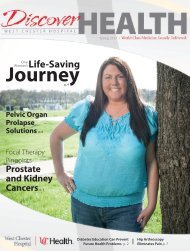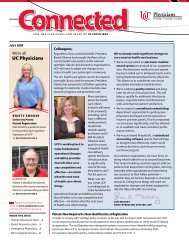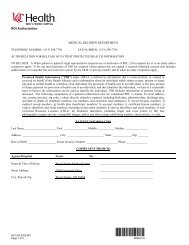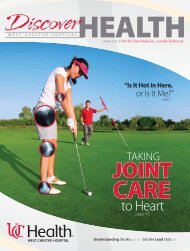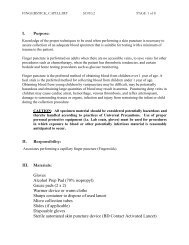Winter 2013 - West Chester Hospital - UC Health
Winter 2013 - West Chester Hospital - UC Health
Winter 2013 - West Chester Hospital - UC Health
You also want an ePaper? Increase the reach of your titles
YUMPU automatically turns print PDFs into web optimized ePapers that Google loves.
Discover HealtH<br />
W e s t C h e s t e r h o s p ii t a l<br />
WINTER <strong>2013</strong><br />
World Class Medicine. Locally Delivered.<br />
Spine Surgery<br />
Can Be a Successful Solution<br />
p. 4<br />
An Inside Look at the Thyroid p. 6<br />
Palliative Care Improves<br />
p. 7<br />
Quality of Life<br />
p. 7<br />
Exercise & COPD p. 2<br />
Life After a Heart Attack p. 3<br />
<strong>West</strong> <strong>Chester</strong> <strong>Hospital</strong> 1
Working Together for a<br />
Stronger Community<br />
Kevin Joseph, MD<br />
It is a critical part of the vision at <strong>West</strong> <strong>Chester</strong> <strong>Hospital</strong> to be the<br />
community’s quality health care partner and a regional leader in<br />
solving complex medical problems.<br />
Being a partner means giving back to the community, reaching<br />
beyond our hospital walls and improving the communities that our<br />
patients and employees call home.<br />
<strong>West</strong> <strong>Chester</strong> <strong>Hospital</strong> has an ongoing, robust commitment to<br />
contribute in-kind services and financial support to fellow nonprofit<br />
organizations that share our goal of improving health care services.<br />
In <strong>2013</strong>, we will continue that support, which takes the form of<br />
donations to events and organizations, sponsorships of health<br />
programs, free health screenings and an array of free community<br />
education and outreach events.<br />
For example, <strong>West</strong> <strong>Chester</strong> <strong>Hospital</strong> makes contributions to more than<br />
three dozen local community groups and charities. These donations<br />
support a wide variety of charitable initiatives and organizations within<br />
the community. In addition, <strong>West</strong> <strong>Chester</strong> <strong>Hospital</strong> will again host free<br />
monthly seminars on a wide range of medical issues and diseases (please<br />
see our calendar on page 8 for details).<br />
<strong>West</strong> <strong>Chester</strong> <strong>Hospital</strong> will remain committed to strengthening our<br />
community. We stand by our promise to serve as our community’s<br />
quality care partner, and will continue to serve as a steadfast partner<br />
for continued growth and sustainability.<br />
Yours in health,<br />
Kevin Joseph, MD<br />
President and CEO<br />
<strong>West</strong> <strong>Chester</strong> <strong>Hospital</strong><br />
Exercise & Pulmonary Disease<br />
The lung is an amazing organ when<br />
you consider it has a capacity of<br />
about six liters (1.5 gallons) of air.<br />
During normal breathing, we only<br />
use a small amount of that volume.<br />
Unfortunately, it is because the lung<br />
is such a robust organ that it may not<br />
be obvious at first that something<br />
bad is happening if we contract a<br />
lung illness like chronic obstructive<br />
pulmonary disease (COPD).<br />
“Human lung capacity is so great<br />
that you can lose around half of<br />
Charles Kim, MD, Pulmonologist your lung function before you even<br />
know it,” says Charles Kim, MD, a pulmonologist at <strong>West</strong> <strong>Chester</strong> <strong>Hospital</strong>.<br />
“That’s why people may not know they have COPD. Once you have<br />
the symptoms, it may mean the damage is done.”<br />
COPD, one of the most common lung diseases, makes it difficult to<br />
breathe. The two main forms are chronic bronchitis, manifested by a<br />
long-term, mucous-filled cough, and emphysema, which results in the<br />
destruction of lung tissue. Most people with COPD have a combination<br />
of these conditions.<br />
The primary cause of COPD is smoking. Other causes stem from heavy<br />
exposure to pollution, workplace fumes or secondhand smoke (basically<br />
repeated toxic lung injury over a period of time).<br />
Dr. Kim says one warning sign is a change in your tolerance of exercise.<br />
Diagnostic tools include a chest X-ray and pulmonary function or<br />
breathing tests.<br />
The hard reality about COPD, as Dr. Kim puts it, is that “The lung<br />
doesn’t regenerate.” The other reality is that COPD can set in even if<br />
a heavy smoker quit more than a decade ago.<br />
“Everyone’s lungs worsen as they grow older. For smokers, their lungs<br />
worsen twice as fast, with lung function declining at an earlier age.<br />
With COPD, destruction of the actual lung tissue takes place, decreasing<br />
the amount of lung you can use.”<br />
The primary cause of COPD is smoking.<br />
What Can COPD Patients Do<br />
Exercise can be key to maintaining what’s left of lung capacity. Pulmonary<br />
rehabilitation, a certified exercise program can help the body<br />
utilize oxygen more efficiently and improve energy levels, circulation<br />
and endurance. Dr. Kim says many people may find it helpful to enroll<br />
in a structured pulmonary rehabilitation program.<br />
Of course, since it’s harder to breathe, it’s harder to exercise. However, Dr.<br />
Kim says, he’s seen many patients overcome the disability.<br />
“I always find it amazing what people can accomplish when challenged<br />
and how much the mind can overcome the body,” he says. “Once a patient<br />
comes to the realization of how poor their lung function is, amazing<br />
progress can be made. The goal of exercise therapy is to preserve<br />
lung function for as long as possible.”<br />
COPD is also treated with maintenance medicines that help<br />
reduce inflammation and constriction in the airways and<br />
preventative care such as yearly follow-ups. In severe cases, oxygen<br />
therapy can be used. In extreme cases, surgery is required<br />
for a lung transplant or to remove parts of the damaged lung to improve<br />
breathing.<br />
Find a primary care physician or respiratory specialist by calling<br />
513-298-DOCS (3627). To learn about respiratory care services<br />
at <strong>West</strong> <strong>Chester</strong> <strong>Hospital</strong>, visit <strong>UC</strong><strong>Health</strong>.com/<strong>West</strong><strong>Chester</strong><strong>Hospital</strong><br />
and choose “Pulmonology/Respiratory Care” under the<br />
“Services” menu.<br />
2 <strong>West</strong> <strong>Chester</strong> <strong>Hospital</strong>
Ady Kendler, MD, was at the gym, doing his regular exercise<br />
routine, when he had a heart attack.<br />
“I started feeling an intense back pain. I thought I had pulled<br />
a muscle. Then I realized it was something more,” said<br />
Kendler. “I asked them to call an ambulance.”<br />
Kendler, a surgical pathologist at <strong>UC</strong> <strong>Health</strong>, had what is<br />
called acute coronary artery syndrome, the blockage of<br />
an artery from a clot. It was successfully removed and there<br />
was no damage to his heart.<br />
In many ways Kendler’s case is atypical. He was in good shape<br />
and wasn’t overweight, unlike many heart attack victims. Even<br />
though he is a doctor, he didn’t immediately think “heart attack.”<br />
“It wasn’t like the textbooks with the classic description of a feeling that<br />
your chest is being crushed,” he says. It turned out Kendler had a family<br />
history of heart problems and the cause was likely genetic.<br />
The prescription for his recovery program, however, was the same<br />
for nearly all heart attack patients these days: an immediate, regular<br />
exercise program in a controlled environment, otherwise known as<br />
cardiac rehabilitation.<br />
“We want to get people exercising, but perhaps not immediately at the<br />
level they had been doing previously,” says Faisal Khan, MD, a cardiologist<br />
at <strong>West</strong> <strong>Chester</strong> <strong>Hospital</strong> and an assistant professor of cardiology<br />
at the University of Cincinnati College of Medicine. “Patients need<br />
to undergo continuous monitoring of blood pressure, heart rate, and<br />
signs of any arrhythmia.”<br />
“Cardiac rehab<br />
takes place within a<br />
controlled environment<br />
where you can slowly<br />
increase the amount of<br />
exercise.”<br />
Faisal Khan, MD, Cardiologist<br />
<strong>West</strong> <strong>Chester</strong> <strong>Hospital</strong> recently opened a cardiac rehabilitation<br />
program.<br />
“For heart attack patients, research shows exercise is as effective, if not<br />
more so, than any other intervention, such as medication,” says Terry<br />
Faulkner, RN, clinical nurse manager for the program.<br />
Indeed, the treatment plan for heart attack patients is almost opposite<br />
that of 20 or 30 years ago. At that time, patients were monitored in the<br />
hospital for days, even weeks, instructed to go home and “take it easy.”<br />
Now it’s “hit the treadmill.”<br />
“The exercise that heart patients need is, in many ways, no different<br />
than what anyone should be doing all along,” Dr. Khan says. “It’s the<br />
same cardiovascular, aerobic workouts. The difference is that cardiac<br />
rehab takes place within a controlled environment where you can<br />
slowly increase the amount of exercise.”<br />
Ady Kendler, MD, a surgical pathologist, was exercising at<br />
the gym when he experienced a heart attack.<br />
Faulkner says there is often a psychological “catch-22” about exercise<br />
for cardiac rehab patients. They understand they need it, but have a<br />
fear of whether their repaired heart can handle it.<br />
“People can go into a depression because of the fear of what they can<br />
do,” says Faulkner. “Sometimes the family unwittingly doesn’t help.<br />
They may hover over a person telling him not to do something. Our<br />
job is to say, ‘Why not You can do this.’ ”<br />
Faulkner says rehab can quickly bring a person’s confidence back.<br />
“They soon realize, ‘Hey, I am safe to exercise and by doing so, I am preventing<br />
a second occurrence.’ ”<br />
Three Phases of Cardiac Rehab<br />
The <strong>West</strong> <strong>Chester</strong> <strong>Hospital</strong> cardiac rehabilitation program is furnished<br />
with state-of-the-art equipment, including many things you see at a<br />
gym – treadmills, bicycles, ellipticals, and other exercise accessories.<br />
“We first educate the patient at the bedside before hospital<br />
discharge so there is a clear expectation,” Dr. Khan says. “It includes<br />
information about diet, exercise and lifestyle modification.”<br />
The second outpatient phase features a rehabilitation regimen tailored<br />
to a patient’s condition and closely monitored within the <strong>West</strong> <strong>Chester</strong><br />
<strong>Hospital</strong> cardiac rehab unit.<br />
The third phase involves the patient following a continuing<br />
exercise program away from the hospital setting that does not require<br />
monitoring.<br />
Kendler says what worked best for him is the group therapy nature of<br />
being in a setting with people facing a similar problem. “I think the<br />
most important thing was having the support of the staff and other<br />
patients,” he says.<br />
In the eight months since his heart attack, Kendler says he’s back to his<br />
regular exercise routine.<br />
Kendler says he learned the importance of managing stress, a problem<br />
common for people from all walks of life. “I realized exercise is not just<br />
good for your heart. It’s great to clear your mind.”<br />
For more information about the cardiac rehabilitation program<br />
at <strong>West</strong> <strong>Chester</strong> <strong>Hospital</strong>, located at 7675 Wellness Way, <strong>West</strong><br />
<strong>Chester</strong>, OH, call 513-298-7799.<br />
<strong>West</strong> <strong>Chester</strong> <strong>Hospital</strong> 3
Spine Surgery<br />
Can be a Successful Solution<br />
Ian Rodway, MD, Spine Surgeon<br />
Tips<br />
for a<br />
healthy back<br />
Back pain may be one of the most common complaints of the human<br />
condition. In the U.S., studies have shown that acute lower back pain<br />
ranks fifth among reasons why people visit a doctor.<br />
Back pain can have multiple causes due to the vast network of nerves,<br />
joints, muscles, tendons and ligaments emanating from the spine. All<br />
can contribute to a problem, with most relieved with steroid medication,<br />
muscle relaxants or physical therapy.<br />
People can do many things to keep their backs healthy, according to Ian<br />
Rodway, MD, a spine surgeon at <strong>West</strong> <strong>Chester</strong> <strong>Hospital</strong>.<br />
“The key is to maintain good core muscle and postural muscle strength,<br />
because these muscles keep everything else in place,” Dr. Rodway says.<br />
“If the core muscles are strong, you’ll be moving correctly and not putting<br />
undue pressure on the lower back.”<br />
Other tips from Dr. Rodway include:<br />
Avoid repetitive impact activities. Do low-impact exercises such as<br />
swimming or elliptical machines rather than running on hard surfaces<br />
for a long time. Running – even on a treadmill – can cause<br />
increased impact and stress on your low back and joints.<br />
Hamstring stretching is important because hamstrings can pull on<br />
the pelvis and the lower back.<br />
Maintain a healthy weight to relieve extra pressure on the spine and joints.<br />
Good posture helps maintain proper spine alignment.<br />
A physical therapist or certified trainer can instruct you on how to<br />
strengthen back muscles and teach proper lifting and bending techniques.<br />
Smoking is bad for your back (in addition to everything else) as it can<br />
cause disc degeneration, and subsequent increased back pain.<br />
A repetitive back problem often means a person hasn’t properly rehabilitated<br />
an injury, which leaves one prone to subsequent problems.<br />
Find an orthopaedic specialist by calling 513-298-DOCS (3627).<br />
To learn about orthopaedic services available at <strong>West</strong> <strong>Chester</strong> <strong>Hospital</strong>,<br />
visit <strong>UC</strong><strong>Health</strong>.com/<strong>West</strong><strong>Chester</strong><strong>Hospital</strong> and click on “Orthopaedics”<br />
under the “Services” menu.<br />
At first, Allison Campbell thought it was just a pinched nerve or stiff neck.<br />
Her pain wasn’t that bad. And the soreness would go away as the day passed.<br />
But the pain continued. “I went through a lot of excuses, like it must be my<br />
pillow or mattress,” says Campbell, 32, of Mason. “I was just avoiding seeing<br />
the doctor.”<br />
Then one morning she woke to excruciating pain in her neck and her right<br />
arm was numb.<br />
“At that point, things go through your mind – what’s going on with my body<br />
I’m a mother of a 10-year-old daughter. This can’t be happening.”<br />
Ian Rodway, MD, a spine surgeon at <strong>West</strong> <strong>Chester</strong> <strong>Hospital</strong>, first treated<br />
Campbell with steroids, which relieved the pain.<br />
Dr. Rodway says Campbell’s initial treatment was typical in that back and<br />
spinal problems are almost always treated first with medication.<br />
“We initially treat with oral steroids, muscle relaxants, physical therapy and<br />
sometimes epidural steroid injections to calm down those pinched nerves,”<br />
Dr. Rodway says.<br />
Dr. Rodway believes the discussion about whether to undergo surgery<br />
should not take place until all other treatments have failed and a patient is<br />
unable to live with the problem.<br />
“We also must consider whether there is significant weakness and numbness<br />
that will contribute to permanent loss,” he says. “When conservative methods<br />
fail, surgery is an option.”<br />
That was the case with Campbell, a teacher at Blue Ash Elementary. Her<br />
numbness had grown worse and extended to her arm. A magnetic resonance<br />
imaging (MRI) scan showed Campbell had what’s known as a bulging<br />
or extruded disc in the cervical spine in her neck. The disc can bulge or<br />
sometimes tear through its outer shell and push into the spinal canal causing<br />
compression of the nerves and the spinal cord.<br />
“When they discovered it, they wondered how I could be walking around and<br />
functioning. I guess I have a high tolerance for pain,” Campbell says. “At first, I<br />
put off surgery because of my job. Then the excruciating pain returned and I<br />
couldn’t lie down. I was seen very quickly and my pain was addressed.”<br />
4 <strong>West</strong> 4 <strong>West</strong> <strong>Chester</strong> <strong>Hospital</strong> <strong>Hospital</strong>
Allison Campbell enjoys<br />
spending time with her<br />
10-year-old daughter.<br />
Dr. Rodway performed Campbell’s surgery at <strong>West</strong> <strong>Chester</strong> <strong>Hospital</strong>.<br />
For Campbell, having surgery resulted in a positive outcome.<br />
“As much as I do not like being poked and prodded with needles, that<br />
was the only hard part,” she says. “Everyone at <strong>West</strong> <strong>Chester</strong> <strong>Hospital</strong><br />
was kind and professional. They catered to everything and anything<br />
I needed.”<br />
Dr. Rodway performed what is commonly called a spinal fusion to the<br />
involved cervical vertebrae. Surgeons use a bone graft that acts as a<br />
bridge between the two vertebrae, allowing the spinal fusion. Metal<br />
plates and screws are used to hold the bone graft and vertebrae together<br />
until the bone grows across the graft.<br />
“Technically, it’s called an anterior cervical discectomy and fusion,” Dr.<br />
Rodway says. “It relieves the pressure from the nerve. Often, with<br />
these surgeries, you can return to normal activities without restrictions.”<br />
Campbell has successfully resumed her active life that includes<br />
a busy schedule as a wife, mom, teacher and runner since the surgery<br />
in September.<br />
“I’m a very physical person, an avid runner, and wave and snow boarder,”<br />
she said. “The first four weeks of recovery I had to stick to walking<br />
and the elliptical. After six weeks I could start running. I started slow.”<br />
It’s not always clear what causes herniated discs, though genetics and<br />
activities are thought to play a major role . In Campbell’s case, she could<br />
recall no single incident where she injured her neck. Doctors know the<br />
problems are more common when there is a family history. Being overweight<br />
or lack of exercise can also weaken muscles making it easier for<br />
a bulging disc to develop. In most cases, pain can lessen in a few weeks<br />
with minimal treatment and surgery remains the exception.<br />
Campbell is pleased that surgery was a successful solution for her and<br />
she has no complaints. “I’ve been able to get back to my normal level<br />
of activity as if nothing had happened.”<br />
<strong>West</strong> <strong>Chester</strong> <strong>Hospital</strong>:<br />
Among Best in Nation for Spine Surgery<br />
<strong>West</strong> <strong>Chester</strong> <strong>Hospital</strong> has been named<br />
one of America’s 100 Best <strong>Hospital</strong>s<br />
for Spine Surgery for 2012-<strong>2013</strong> by<br />
<strong>Health</strong>grades®, a leading provider of<br />
consumer health information.<br />
The five-star recognition placing <strong>West</strong> <strong>Chester</strong> <strong>Hospital</strong> among<br />
the top 10 percent in the nation for spine surgery is part of a<br />
<strong>Health</strong>grades report, “American <strong>Hospital</strong> Quality Outcomes<br />
<strong>2013</strong>,” which evaluates the performance of approximately 4,500<br />
hospitals nationwide across 30 of the most common conditions<br />
and procedures.<br />
<strong>Health</strong>grades independently measures hospitals based on data<br />
the hospitals submit to the federal government.<br />
Other <strong>West</strong> <strong>Chester</strong> <strong>Hospital</strong> recognitions from <strong>Health</strong>grades:<br />
<strong>2013</strong> Spine Surgery Excellence Award<br />
One of the top five hospitals in Ohio for Spine Surgery<br />
The <strong>2013</strong> <strong>Health</strong>grades Report to The Nation,<br />
including complete methodology, can be found at www.<br />
healthgrades.com/quality.<br />
<strong>West</strong> <strong>Chester</strong> <strong>Hospital</strong> 5
An<br />
Inside<br />
Look<br />
at the Thyroid<br />
In consumer healthcare reporting, it seems the thyroid gland is<br />
rarely mentioned, but why For most people, the gland just keeps on<br />
secreting, and there is actually nothing we can do to “maintain” or<br />
“exercise” our thyroid.<br />
“Many patients with thyroid dysfunction and/or nodules have a family<br />
history of a thyroid problem,” says David Steward, MD, ear, nose and<br />
throat specialist at <strong>West</strong> <strong>Chester</strong> <strong>Hospital</strong> and professor of thyroid/<br />
parathyroid disorders at the University of Cincinnati College of Medicine.<br />
“The main risk factors for thyroid cancer are a family history, or a history<br />
of radiation exposure.”<br />
Diagnosis of a thyroid condition<br />
is fairly straightforward – a<br />
blood test can measure the<br />
amount of thyroid hormones.<br />
The thyroid gland is located in the neck just below the Adam’s apple and<br />
produces hormones that regulate the body’s metabolism; that is, how<br />
quickly and efficiently the body’s cells use energy. It produces thyroid<br />
hormones and controls how sensitive the body is to other hormones.<br />
Two main thyroid problems can occur with thyroid function – an<br />
overactive gland (hyperthyroidism) and an underactive one<br />
(hypothyroidism).<br />
“The symptoms for an underactive thyroid include chronic fatigue,<br />
lethargy and weight gain,” says Dr. Steward. “For an overactive thyroid,<br />
there can be palpitations, tremors and weight loss.”<br />
Although symptoms are non-specific, diagnosis of a thyroid condition is<br />
fairly straightforward – a blood test can measure the amount of thyroid<br />
hormones. Hypothyroidism (underactive) can be treated with hormone<br />
medication. A hypothyroid (overactive) gland also may be treated with<br />
medication to reduce thyroid hormone production..<br />
“Thyroid cancer may occur in thyroid nodules,” Dr. Steward said. “They can<br />
be thought of as lumps or bumps within the thyroid with approximately<br />
a five percent chance of malignancy.”<br />
The presence of nodules – benign or malignant – most often have<br />
little effect on the functioning of the thyroid. For reasons not fully<br />
David Steward, MD, ENT specialist, discusses thyroid disorders with a patient.<br />
understood, thyroid nodules are far more common in women,<br />
according to Dr. Steward.<br />
A doctor can detect nodules in a routine exam, or they might show up<br />
on imaging of the spine, lungs or neck. Ultrasound is used to evaluate<br />
neck, chest or thyroid nodules. If malignancy is suspected, it can be<br />
diagnosed with an ultrasound-guided fine needle biopsy.<br />
Thyroid cancer has one of<br />
the highest cure rates.<br />
Thyroid cancer has one of the highest cure rates. “Thyroid cancer is<br />
increasing in frequency, but the prognosis is overall favorable,” says Dr.<br />
Steward. “There are a couple types of aggressive thyroid cancer, but<br />
thankfully, those are extremely rare.”<br />
In general, Dr. Steward says people needn’t worry about the thyroid,<br />
unless symptoms appear. “People with a family history of thyroid<br />
conditions or history of radiation exposure or treatment should<br />
always inform their primary care physician who may question them,<br />
palpate their thyroid gland and order additional blood tests or<br />
imaging,” he says.<br />
For the name of an ear, nose and throat specialist or a cancer physician,<br />
call 513-298-DOCS (3627).<br />
Looking for Your Input<br />
We would like to hear from you! Please<br />
share your feedback about Discover <strong>Health</strong><br />
magazine as well as your ideas or health<br />
topics that you would like to see included<br />
in upcoming issues. Send feedback to <strong>West</strong><br />
<strong>Chester</strong> <strong>Hospital</strong> by emailing WCH@<strong>UC</strong><strong>Health</strong>.<br />
com. Thank you for your input!<br />
6 <strong>West</strong> <strong>Chester</strong> <strong>Hospital</strong>
Palliative Care Improves<br />
Quality of Life<br />
The code of medical ethics instructs physicians to “first, do no harm.” The<br />
new palliative care program at <strong>West</strong> <strong>Chester</strong> <strong>Hospital</strong> takes the next logical<br />
step by asking, “How can we make quality of life better”<br />
Palliative medicine is the field of health care that focuses on relieving the<br />
suffering of patients and improving their quality of life. It is appropriate<br />
for all diseases and all stages of illness, not only end-of-life care. Palliative<br />
care usually focuses on symptoms, regardless of whether the treatment has<br />
a curative effect on the underlying causes of an ailment.<br />
“When we started the program we decided on a motto to sum up our<br />
approach. It is: ‘I am here to help you,’ ” says Edward Crane, MD, medical<br />
director of hematology/oncology and the palliative care program at<br />
<strong>West</strong> <strong>Chester</strong> <strong>Hospital</strong>. “There is a resurgence of interest in palliative<br />
care. People are understanding you can’t exclusively focus on a disease<br />
and not focus on the well-being of the patient.”<br />
Although most hospitals offer some palliative care component, Dr. Crane<br />
says the <strong>West</strong> <strong>Chester</strong> <strong>Hospital</strong> program, is one of the most comprehensive<br />
in the region. Four staff physicians are available on a rotating basis for palliative<br />
consultations. Three of those physicians are certified in the field, a<br />
rarity within one hospital, according to Dr. Crane.<br />
The program is far more involved than a physician simply paying a visit<br />
and making spur-of-the-moment recommendations.<br />
“It’s a multidisciplinary approach,” Dr. Crane says. “We bring in experts<br />
in physical therapy, nutrition, spiritual care, pharmacy, social<br />
services and other care disciplines. Our team assesses the overall<br />
status of the patient. The physician then creates a plan based on the<br />
team’s recommendations.”<br />
Palliative care can apply to a range of issues, including the side effects of<br />
chemotherapy, COPD, dementia, depression or heart failure. They make<br />
recommendations about medicines, like morphine, for pain control.<br />
The program deals with home care needs as well. “We look at the tools<br />
and resources that can return a patient home successfully,” Dr. Crane<br />
says. “Our social workers get involved. Sometimes it’s just an issue of<br />
reviewing medications. The point of palliative care is that the quality of<br />
the patient’s life must be improved.”<br />
While the palliative team is involved in providing end-of-life care, Dr.<br />
Crane says the vast majority of consults involve how to improve the<br />
quality of life for the patient who isn’t ready for hospice care.<br />
Palliative care is the field of medicine<br />
that focuses on relieving suffering while<br />
improving quality of life.<br />
Palliative care can help a patient decide upon advanced directives, often<br />
known as a living will, and a healthcare power of attorney, specifying<br />
the course of treatment to be allowed if patients are unable to participate<br />
in decisions in their final days. The directives can forbid certain<br />
burdensome treatment and may deal specifically with whether to forgo<br />
medical devices or even food and water.<br />
While having advanced directives is helpful for the medical team, Dr.<br />
Crane thinks it’s not so much the documents that are important, but the<br />
conversation that they require families to have.<br />
“Sometimes it doesn’t matter what’s on paper, as long as the family comes<br />
together. It’s important to promote this discussion so family members<br />
can hear and understand the patient’s wishes.”<br />
Dr. Crane says he became interested in establishing a palliative care<br />
program at <strong>West</strong> <strong>Chester</strong> <strong>Hospital</strong> after working with patients in his<br />
private practice. He wanted the program to be comprehensive and<br />
multidisciplinary. He found an involved palliative team helps attending<br />
physicians obtain a full assessment of his/her patient from an educated<br />
independent outside source which can ensure that treatment goals of<br />
the patient and attending physician are aligned. “I have been impressed<br />
with the passion of our team which includes Dr. Prasad Kudalkar, Dr.<br />
Charles Kim and Dr. Arvind Modawal,” Dr. Crane says. “When we<br />
developed this program, we actually had many physicians coming to us<br />
saying, ‘Thank you, this is going to be very helpful.’ ”<br />
Edward Crane, MD, oncologist and medical director of the<br />
palliative care program at <strong>West</strong> <strong>Chester</strong> <strong>Hospital</strong>, is a strong<br />
proponent of improving quality of life for all patients.<br />
<strong>West</strong> <strong>Chester</strong> <strong>Hospital</strong> 7
<strong>West</strong> <strong>Chester</strong> <strong>Hospital</strong><br />
7700 University Drive<br />
<strong>West</strong> <strong>Chester</strong>, OH 45069<br />
NON-PROFIT ORG<br />
US POSTAGE<br />
PAID<br />
GREENFIELD CINCINNATI OH<br />
PERMIT #1232 785<br />
Discover <strong>Health</strong> is a quarterly magazine published by <strong>West</strong> <strong>Chester</strong> <strong>Hospital</strong> to provide accurate and timely health information. It is offered as a health education tool featuring news and stories centered<br />
around academic-based, discovery-driven health care - it is not a substitute for consultation with a personal physician. <strong>West</strong> <strong>Chester</strong> <strong>Hospital</strong> is located at 7700 University Drive, <strong>West</strong> <strong>Chester</strong>,<br />
Ohio 45069. For information, call (513) 298-3000 or visit www.<strong>UC</strong><strong>Health</strong>.com/<strong>West</strong><strong>Chester</strong><strong>Hospital</strong>. If you do not wish to receive future issues of this publication, please email WCH@<strong>UC</strong><strong>Health</strong>.com.<br />
Calendar of Events<br />
<strong>West</strong> <strong>Chester</strong> <strong>Hospital</strong> is a health information resource for people in <strong>West</strong> <strong>Chester</strong> and surrounding communities. Events and<br />
activities listed on this calendar are held within <strong>West</strong> <strong>Chester</strong> <strong>Hospital</strong>, 7700 University Drive, <strong>West</strong> <strong>Chester</strong>, Ohio 45069, unless<br />
otherwise noted. To register for community seminars, call 513-298-3000.<br />
<strong>UC</strong> <strong>Health</strong> Weight Loss Center Informational Seminars<br />
Thursdays (7-8 p.m.): March 14, March 26, April 18, May 16, Plaza Conference Room, Level A<br />
Register online at <strong>UC</strong><strong>Health</strong>.com/WeightLoss.<br />
Colon <strong>Health</strong> Community Seminar<br />
Wed., March 27 (7-8:30 p.m.) AND Sat., March 30 (9-10:30 a.m.), Plaza Conference Room, Level A<br />
Foot & Ankle <strong>Health</strong> Community Seminar<br />
Wed., April 24 (7-8:30 p.m.) AND Sat., April 27 (9-10:30 a.m.), Plaza Conference Room, Level A<br />
SAVE THE DATE! Summer of Love: Second Annual <strong>West</strong> <strong>Chester</strong> <strong>Hospital</strong> Fundraiser Gala<br />
Friday, April 26 (7-11 p.m.), Cincinnati Marriott North<br />
Skin Cancer Community Seminar<br />
Wed., May 15 (7-8:30 p.m.) AND Sat., May 18 (9-10:30 a.m.), Plaza Conference Room, Level A<br />
Like Us on Facebook<br />
and stay informed about<br />
upcoming seminars and<br />
events at <strong>West</strong> <strong>Chester</strong><br />
<strong>Hospital</strong>!<br />
<strong>West</strong> <strong>Chester</strong> <strong>Hospital</strong><br />
Named one of America’s 100 Best <strong>Hospital</strong>s<br />
for Spine Surgery TM for 2012-<strong>2013</strong><br />
by <strong>Health</strong>grades®<br />
8 <strong>West</strong> <strong>Chester</strong> <strong>Hospital</strong><br />
<strong>UC</strong><strong>Health</strong>.com/<strong>West</strong><strong>Chester</strong><strong>Hospital</strong>


